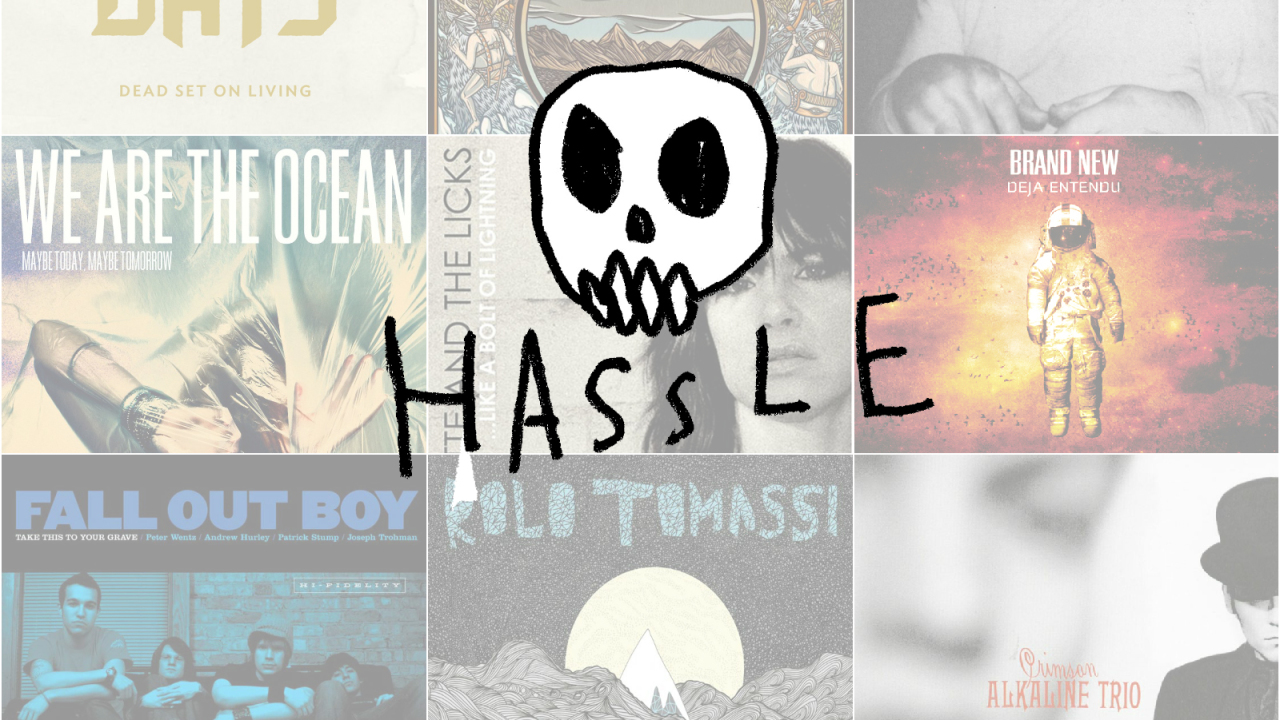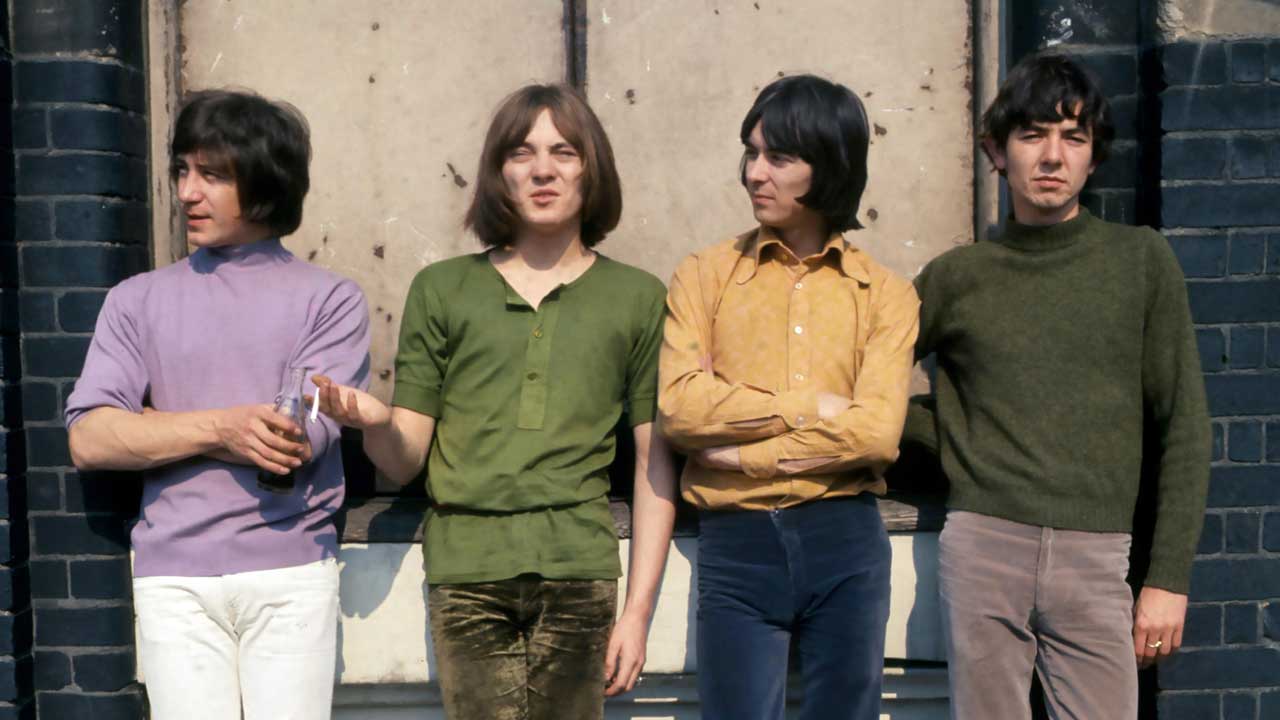The inside story of Hassle Records
Label boss Wez looks back on a decade which brought Fall Out Boy, Alexisonfire and Brand New to a British audience.

Select the newsletters you’d like to receive. Then, add your email to sign up.
You are now subscribed
Your newsletter sign-up was successful
Want to add more newsletters?
Hassle Records turns 10 years old this year. Over the years, they’ve signed Fall Out Boy, Brand New, Alexisonfire, Cancer Bats, and released albums by Rolo Tomassi, Alkaline Trio, Anti-Flag, and more recently frnkiero andthe cellabration. We spoke to Hassle boss Ian Westley, aka Wez, about the label’s beginnings and the secret to navigating the music industry’s choppy waters…
How did the label first come about? “I was at a bigger independent label before – we did bands like Muse, Garbage, Zero 7, and other dance stuff. It was a pretty successful company, and it was being sold to Warner Bros, but I didn’t want to go to Warner Bros because I didn’t want to be working for people like Paris Hilton. Music has always been the key to dictating what I want to do, so I thought I’d start my own thing. And that was just under 10 years ago now, which was when Full Time Hobby and Hassle first started. As we started the whole thing we were signing lots of indie acts, but we also wanted to sign lots of rock and metal acts, so we split the label into two, and Full Time Hobby and Hassle became their own separate labels. Those two different genres have different audiences, and we wanted to serve them both.”
Did you base your model on any existing record labels? “We grew up on labels like Sub Pop, where you knew when something came out on that label it was going to be quality. And I guess the label that’s had the biggest influence on us is Epitaph; they had Epitaph and their sister label ANTI, so you’d have Tom Waits on ANTI and then all the punk, rock and metal stuff would be on Epitaph. Nigel Adams – who set the company up with me – has got more of an indie and singer-songwriter background, whereas I’ve got more of a metal background, so we split the roles across the labels.”
**Who was your first signing? **“Well, we initially started off as Eat Sleep Records and Sore Point Records – they were the initial labels. But for legal reasons we had to change the names after about a year. And we signed two or three acts to Sore Point, which became Hassle. One of those bands was Fall Out Boy, and we signed them on their first album Take This To Your Grave for £1,000, which went on to sell 140,000 copies. So that definitely helped us get running.” Do you think independent labels need a lucky break like that to help set themselves up long-term? “No doubt about it - everybody does. We signed bands like The Beautiful Mistake in the early days, and they were great but their album didn’t connect and the band split up. Now why aren’t they a massive band now, when someone like Alexisonfire is? Who knows? I guess the quality of songs with a writer like Dallas Green count for a lot, but plenty of other great songwriters don’t make it. I guess you get scenes don’t you, so certain scenes rise and six, or eight, or ten bands come along and ride that wave, and then a couple of those bands go on to transcend the scene; bands like Fall Out Boy, My Chemical Romance and Brand New. And then those other bands often fall away. So there’s definitely an element of luck for everyone involved.”
**How difficult is it to hold on to the bands that do get big, and keep them on an independent label? **“When you’re a small company like us it is difficult, because you can’t pay the up-front advances that bigger bands need. Somebody said to me the other day, if we have been able to finance those bands for four, five or six album deals like the major labels do, we’d have Brand New, Alexisonfire, maybe Fall Out Boy, and all the English acts that we’ve been bringing through over the years. If we’d have had the money to do that – and kept those bands – we’d be one of the biggest rock labels in the world. But we’re a small independent label so we haven’t been able to do that yet. I’m not saying we don’t want to do that either.”
**You’re obviously running a business, but is there an element of heartache when a band leaves your label? **“Of course, yeah. When you start out with a band, the band are nothing and everybody is in it for the right reason, which of course is the music. But as things move on you need to generate money to live, because everybody’s got to pay rent. So certain bands start to look for different things and it’s hard for you as an independent to provide that, so they start to look elsewhere. And that’s when heartache can happen. We’ve had a few bands leave us, and then a couple have come back because they’ve realised the grass isn’t as green as they thought it was on the other side. The problem is when they come back it’s often not quite as exciting as it was before. What we’ve done with We Are The Ocean for their fourth album is a deal with BMG, who’ve put X amount of money into them and that’s been a really good thing for us. And we’re hoping in ten years time they’ll be a big, solid UK rock act.”
**Is this the first time you’ve done a joint venture with a larger record label? **“It is, yes.”
The latest news, features and interviews direct to your inbox, from the global home of alternative music.
And has that opened the door to take a similar approach with other bands? “Maybe, yes. It’s not what we aspire to do – we’d rather keep them on Hassle. But this was just a way of making our relationship with the band continue, and providing them with the finances they need to do what they want to do. That’s the reality of where we are, because people don’t really like paying for music that much these days, we needed to find a way of paying for the band to tour and make a record.”
How different is the music industry now compared to when the label first started out? “It’s harder for bands to make a living now because the record companies used to fund everything, so if you don’t get to a certain level relatively quickly it’s quite hard for them. But we kind of saw this coming 10 years ago anyway, which is why we manage bands like Lonely The Brave as well as doing the record company side of things. Our business changes pretty much on a weekly basis, so when we’re talking to bands we’ll say, ‘Look, this is difficult to do just on its own, so maybe we need to do another side of the business.’ But we’d never say to a band, ‘You must do this with us.’ It’s all about finding the right way of working with them. So now we’re a record label, a publishing company and a management company, and we do different sides of the business with different bands – each act is different and we cut the cloth accordingly.” ** As the head of the label, do you still go out yourself and scout new talent? **“I do, definitely. A lot of guys who are running bigger companies don’t do that, because they have teams of scouts that do that for them. But I’m out seeing new bands as much as I can.” **Who’ve been some of your proudest discoveries and signings over the years? **“Alexisonfire was great because when we started with them it was nowhere really. And we did the first three albums with them. You could feel from day one that they were a special band. We picked up Brand New really early on too. The first song by them that I heard and really loved was Jude Law and A Semester Abroad, and of course that’s so different to where they are now, but that’s just the sign of a really good band developing. We Are The Ocean too – where they were on that first album compared to where they are now is completely unreal, and that’s kind of what it’s all about. When Dan (Brown, vocals) left the band, that was a very tricky time, but I can see why the band wanted to do it and it was up to them what they wanted to do. We just had to embrace it and make the best of the situation, and actually musically the way they’ve transformed themselves since then is incredible. But they were still really young then, and it’s exciting watching a band mature as well – both as musicians and people.”
How much has the internet changed the way you discover new acts? “It’s beyond recognition now compared to what it was like before. In terms of signing acts, you’ve got to be on it very quickly, and as a company we have to be braver and get stuff earlier because we don’t have the finance to chuck money at a band and then lose it. So we also have to be careful too. With a band like Turbowolf for instance, you have to recognise the fact that they’re a great band and then get on it, even though quite a few people were saying they didn’t see it. But I thought they were brilliant, even back then. So from that point of view we kind of ignore everybody else and just do our own thing. Stats are now a big thing for companies signing bands too – Facebook likes and YouTube plays, and all that stuff. That’s now being used to point people in a certain way, and I guess for certain companies that’s important, but we don’t care about all that. What’s different for bands now with the internet, is because everything’s so accessible they have to be writing better songs all the time. 20 years ago bands could put an album out, and because that was the only thing somebody could get hold of, you could get away with having four good tracks on an album. But you can’t now. So I think it’s much more difficult for bands now than it was 20 years ago, I really do, because the quality control has got to be so tight.” What does the future hold for the record labels? “I don’t think there’s such thing as a record company anymore. We call ourselves a music company, and our record label business is the core of what we do, but then all these other areas spin off from that. The whole industry is changing drastically, and we’re adapting to that. It’s all about teams of people helping bands and artists get their music out there in the right way. That’s all we do really, it’s as simple as that. And the whole thing driving it is the music. There’s nothing better than hearing a band writing a new track and going, ‘Fuck! That’s amazing.’ You lose that; you’ve lost everything…”
Hassle Records are offering a free 10-track compilation. For details on how to get it, click here.
DJ, presenter, writer, photographer and podcaster Matt Stocks was a presenter on Kerrang! Radio before a year’s stint on the breakfast show at Team Rock Radio, where he also hosted a punk show and a talk show called Soundtrack Apocalypse. He then moved over to television, presenting on the Sony-owned UK channel Scuzz TV for three years, whilst writing regular features and reviews for Metal Hammer and Classic Rock magazine. He also wrote, produced and directed a feature-length documentary on Australian hard rock band Airbourne called It’s All For Rock ‘N’ Roll, and in 2017 launched his own podcast: Life in the Stocks. His first book, also called Life In The Stocks, was published in 2020. A second volume was published in April 2022.

